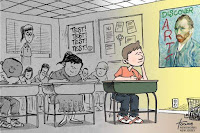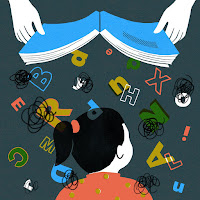Education Readings
Editorial
The new term is underway and hopefully teachers now have some time for some reflective reading? Establishing a new class is a challenging
experience and, under pressure, it is easy to fall back to doing what has
always been expected. It was John Dewey
who wrote that you don’t learn from
experience but rather by reflecting on experience. Asking what things went well and what might
need to change- and if change is required,where to find the relevant information are important questions? This is where our readings might be of use.
 |
| Still worth a read |
This set of readings focus on the importance of
creativity and the development of every student gifts and talents. Now that
National Standards have gone we think it is an important issue.
Allan Alach and Bruce Hammonds
 ‘Today companies are realizing that they need to develop employees talent … to attract, retain and build talent. So what does this mean for schools? Surely our first task in schools should be to identify what each one of our students can do. What talents do they have? There’s increasing evidence that suggests that if students show a preference, passion or natural aptitude for a certain area, then ultimately, despite what “school” might think, there’s a very good chance that it will be those areas that will provide them with their best career and life choices.’
‘Today companies are realizing that they need to develop employees talent … to attract, retain and build talent. So what does this mean for schools? Surely our first task in schools should be to identify what each one of our students can do. What talents do they have? There’s increasing evidence that suggests that if students show a preference, passion or natural aptitude for a certain area, then ultimately, despite what “school” might think, there’s a very good chance that it will be those areas that will provide them with their best career and life choices.’
‘Many teachers talk about creativity but what does being creative mean? I don’t believe there is any one way to be ‘creative’. There aren’t five stages you need to go through to be creative. I do think there’s some value in understanding what is considered ‘the five stages of the creative process, I’m just not sure I believe them…’
4 Ways to Develop Creativity in Students
 Creativity is a valuable skill, and there are common strategies teachers can use to help students develop it Creativity is the most difficult thinking skill to acquire, and also the most sought-after. We value it in our music, entertainment, technology, and other aspects of our existence. This article suggests ideas for teachers to use to encourage creativity.
Creativity is a valuable skill, and there are common strategies teachers can use to help students develop it Creativity is the most difficult thinking skill to acquire, and also the most sought-after. We value it in our music, entertainment, technology, and other aspects of our existence. This article suggests ideas for teachers to use to encourage creativity.
School Kills Creativity?
Think! Figuring out that schools kill your creativity actually stimulates your inner self to be more creative. A short and creative read. Take a look.
 The need to place creativity central to all learning -reflecting on the consequences of three decades of standardised teaching.
The need to place creativity central to all learning -reflecting on the consequences of three decades of standardised teaching.
‘There is now a strong sense that creativity should be nurtured in classroom settings yet there is little understanding how effective and creative teachers function. After three decades of standardised education, since the introduction of Tomorrow’s Schools, now is the time to place the focus on creativity.’
Creativity can’t be left to chance – it must be taught
‘Innovation often isn’t about acquiring new knowledge, but by seeing the knowledge you already have from fresh perspectives; or even through conflict and argument. Sometimes, innovation occurs through a lone genius with incredible insight, but not often. It’s collaboration that usually gets the job done.’
Observation Skills May be Key Ingredient to Creativity
‘The benefits of mindfulness, or being fully conscious and aware of one’s actions and surroundings, have been well documented. Studies show that only certain mindfulness traits are linked to increased creativity. Studies would suggest, they should focus on sharpening powers of observation’
Building a Positive Staff Culture Takes Work
‘Culture is always at play in a school’s success or failure, whether
members of that culture realize it or not.
If leaders want more collaboration, they must allot time to build trust
and mutual respect.’
Are We Innovating, or Just Digitizing Traditional Teaching?
‘What has been gained through the introduction of modern information technology into our classrooms – and what has been lost? Blended learning has the potential to transform the way teachers teach and students learn—if we take advantage of all that it offers. While blended learning brings with it the promise of innovation, there is the peril that it will perpetuate and replicate existing practices with newer, more expensive tools.’
Nurturing Habits of Mind
 Many New Zealand teachers are aware of the work
of Art Costa and Bena Kallick and their wrings about ‘habits of mind’ – these
dispositions have much in common with the New Zealand Curriculum’s Key
Competencies. Take the time to read the introduction to their new book. A
‘habit of mind’ means having a disposition toward behaving intelligently when
confronted with problems to help student find the answers which are not
immediately known.
Many New Zealand teachers are aware of the work
of Art Costa and Bena Kallick and their wrings about ‘habits of mind’ – these
dispositions have much in common with the New Zealand Curriculum’s Key
Competencies. Take the time to read the introduction to their new book. A
‘habit of mind’ means having a disposition toward behaving intelligently when
confronted with problems to help student find the answers which are not
immediately known.
Some good advice for school principals – what teachers want you to
know
 ‘It’s because I talk to teachers every week I see how many of them
are struggling. Some are engaged in a healthy struggle, the “good stress” of
working at a challenging job. If we think of teacher stress as a continuum, I
would put these teachers at the healthy end. At the other end, the struggle has
a different character, a kind of desperation that goes beyond “good stress.” After
listening to thousands of teachers tell their stories, I have reached the
conclusion that there is one deciding factor that determines whether the
teachers in any given school will lean toward positive and productive or
desperate and crushed: That element is the principal.’
‘It’s because I talk to teachers every week I see how many of them
are struggling. Some are engaged in a healthy struggle, the “good stress” of
working at a challenging job. If we think of teacher stress as a continuum, I
would put these teachers at the healthy end. At the other end, the struggle has
a different character, a kind of desperation that goes beyond “good stress.” After
listening to thousands of teachers tell their stories, I have reached the
conclusion that there is one deciding factor that determines whether the
teachers in any given school will lean toward positive and productive or
desperate and crushed: That element is the principal.’
Modern classrooms won’t fix education – something to think about
‘Teachers in a traditional classroom setting can still use
collaborative and flexible processes, utilise the physical space to maximise
learning time, and employ technology to enrich the learning experience of
students. . So, why the need for a makeover? Are we just equating ‘modern’ with new
and effective, and ‘traditional’ with old and ineffective, in the hope that the new will overcome
the old.’
Kids Spend Less Time Outdoors Than Prisoners
‘With the rise in ‘learning’ through screens this is worth thinking
about. Is virtual reality excluding experiences in the real world?’
Earlier postings by Bruce on the
creativity/talent theme
Schools for talent development
‘Something is rotten in the state of education. Shouldn’t an
education system be about helping every learner develop their particular
talents, passions and dreams? Shouldn’t teachers see their role as developing
an individual learning pathway for every learner one based on their passions,
interests, dreams or talents?’
Asterix theory of talent development
‘Children do not see themselves as apprentice adults but rather they
try to be as good as they can be whatever their age. What they want to do is to
find a niche within their group of peers, conforming to expectations on one
hand, while at the same time differentiating themselves on the other.
Developing this balance is a continuing universal challenge for us all.’





































